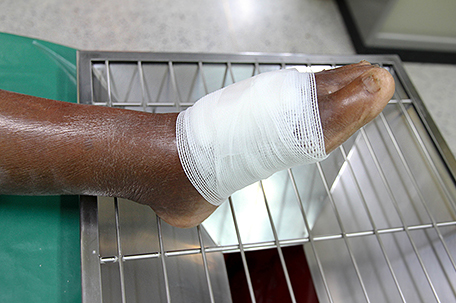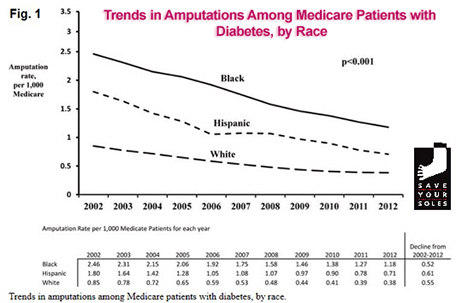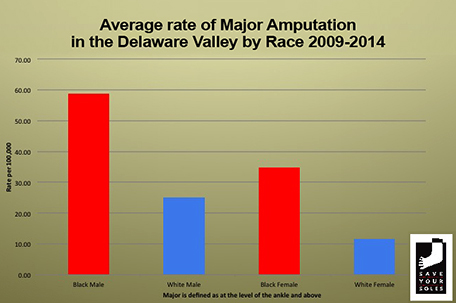
ABOVE PHOTO: shutterstock
Abington podiatrist promotes preventative diabetes maintenance to stem the tide of amputations in the region’s African-American male community.
By Amy V. Simmons
Every 23 seconds someone is diagnosed with diabetes, according to the American Diabetes Association. The disease doubles the risk of heart attack or stroke and can cause kidney failure, blindness, and lower limb amputation. Although research and education have dramatically decreased diabetes-related complications, diabetes is still one of the leading causes of death in the United States.
Amputations are one of the most visible manifestations of this often invisible yet deadly disease. African-American men in Philadelphia are four times more likely than White males to have foot amputations, says Dr. Ronald Renzi, a podiatrist at Abington Memorial Hospital. Renzi has been practicing podiatric medicine in the Philadelphia area for over 25 years.

Dr. Ronald Renzi
Save Your Soles is a grassroots program focused on eliminating this disparity. They work with community churches and other groups to heighten awareness, and to ultimately reduce amputations. The program teaches the importance of keeping blood sugar under control, taking medications as prescribed, eating healthy foods, and getting regular exercise.
“We want to reach every Black man in Philadelphia regarding diabetic foot care,” Renzi said. “Black women are doing that [taking care of their feet], and numbers are going down. We know we can do this.”
The Save Your Soles Campaign does outreach via radio during September — which coincides with the American Heart Association’s Peripheral Artery Disease (PAD) Awareness Month — urging African-American men to get screened for diabetes and its related complications. They also do a targeted mail outreach to areas of the city which have high numbers of African-American residents. Last year, they sent 8,000 postcards to men the 19144 zip code area in Germantown alone.
“As a result of that mailing, 16 men came to receive testing,” Dr. Renzi said. “Out of that group, two were diagnosed with diabetes. We actually saved the life of one of them.”
The amputation rate for African-American women in Philadelphia have been decreasing, but the rate for men has been increasing. According to Renzi, statistics show that 252 men in Philadelphia had amputations in 2015, up from the previous year, while comparably, 131 women had to have the procedure, which was down significantly from the same year.
Renzi pointed to a recent survey conducted by The Philadelphia Health Management Corporation (PHMC), which revealed the fact that 15 percent of African-Americans in Philadelphia have been diagnosed with diabetes. The amputations in Philadelphia are also higher than that of its surrounding counties.


There are many mitigating circumstances contributing to this statistical anomaly, including the reluctance in general of men to seek medical attention for conditions they perceive as something they can “power through” like pain; unlike women, who tend to visit doctors on a more regular basis, and not just in emergency situations.
Another possible contributing factor in African American male reluctance is a traditional mistrust of doctors. This phenomenon has its origins in historic medical testing nightmares like the Tuskegee Syphilis Study, where hundreds of men were falsely lured into the study – initially being told they would be treated for “bad blood” free of charge without being given all the facts, and were deliberately left untreated, even after penicillin became the drug of choice in 1947.
Legacies like this are legend in the Black community, and something medical professionals must consider when addressing health disparities within this population. Trust has to be earned.
“Traditional answers have included reasons like socioeconomic status and insurance [disparities], but in Philadelphia, women [with diabetes] are doing well, while men are not,” Renzi said. “Mistrust is a big factor. When I speak to groups of vascular physicians, I often tell them [directly] ‘Black men don’t trust you.’ This is a problem.”
The United States has the highest degree of disparity in the world when it comes to amputations in its African American population, Renzi says. Other countries with people of African descent — such as the United Kingdom — have much lower rates.
The most important tool in the diabetic’s maintenance kit to help prevent amputations is maintenance itself.
“Patients should manage their diabetes and blood sugar, have their feet examined, and be tested at least once a year – twice a year if diabetes runs in the family,” Dr. Renzi said.
Yearly foot examinations are especially imperative for all diabetes, including an ankle brachial index test (ABM).
“The ankle brachial index test (ABI) gives you a measure of how much blood flows into your feet, Dr. Renzi said. “A healthy reading is one percent. Anything from 50 percent (.5) or below, and you are really in big trouble.”
Exercise is also essential for the prevention of amputations. Expensive gym memberships and footwear — while good to have — are not necessary to begin a regular walking regimen.
“It is important for people with diabetes to walk a lot,” Renzi said. “A good, low-cost athletic shoe will do fine. It is better just to start.
Any cramping in the calf muscles, foot pain or any visible changes need to be taken seriously by diabetics, and should prompt a visit to the doctor to rule out any new developments in the disease process, Dr. Renzi stated. It often presents as a minor symptom, due to the reduced sensation of pain diabetes are prone to experience. Ignoring changes can lead to amputations which could have been prevented or death.
For more information about the Save Your Soles Campaign, contact Dr. Renzi’s office at (215) 884-0140, or visit: www.renzipodiatry.com/save-your-soles.html .
















Leave a Comment